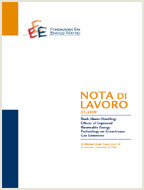Second-Best Analysis of European Energy Policy: Is One Bird in the Hand Worth Two in the Bush?

23.11.2015
Michael Hübler (Institute for Environmental Economics and World Trade – Leibniz Universität Hannover); Oliver Schenker (Centre for European Economic Research ZEW); Carolyn Fischer (Resources for the Future RFF)
C61, O33, Q48, Q54, Q55
Second-best, Climate Policy, Energy Policy, Feed-in tariff, Power Sector, EU
Climate Change and Sustainable Development
Carlo Carraro
This paper studies policy instruments that correct insufficient learning-by-doing (LbD) and research and development (R&D) of renewable electricity technologies and insufficient investments in energy efficiency (EE) in the presence of carbon pricing. The theoretical model analysis shows how to re-adjust the first-best in second-best situations, in which one of the policy instruments is restricted. Calibrated to the European power sector, the first-best choice of all instruments reduces the climate policy cost by one third. Feed-in tariffs turn out to be good substitutes for LbD, but not for R&D or EE subsidies.
***
Suggested citation: Hübler, M., O. Schenker, C. Fischer, ‘Second-Best Analysis of European Energy Policy: Is One Bird in the Hand Worth Two in the Bush?’, Nota di Lavoro 106.2015, Milan, Italy: Fondazione Eni Enrico Mattei
